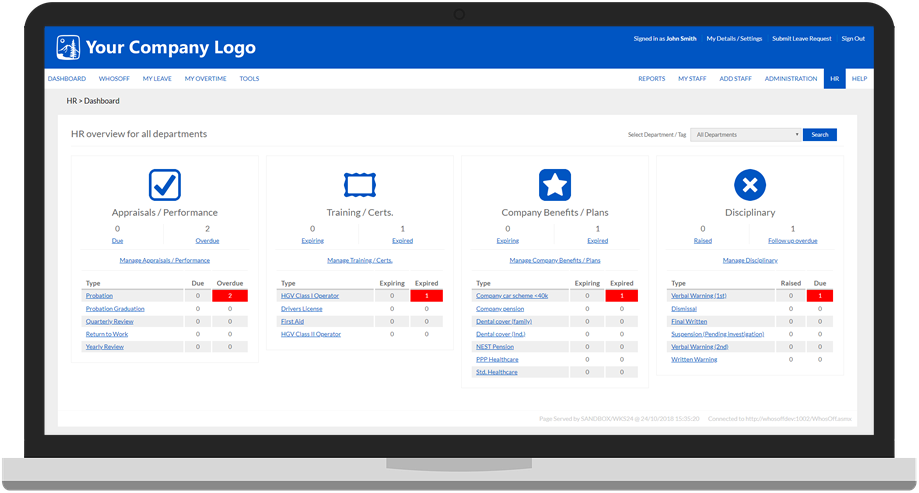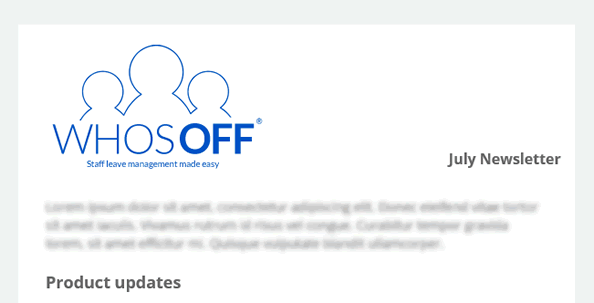We all look forward to a few days off work – and most of the time our annual leave goes ahead as planned. But what happens when it doesn’t, and you fall ill before or during your holiday. Can you claim back that annual leave if you fall sick?
WhosOff explains the ins and outs of reclaiming holiday for employers and employees…
Am I legally entitled to sick leave?
Every professional has the right to take time off work if they’re ill. It’s as much for your employer’s benefit that you’re at home resting and recharging as for yours!
For most minor illnesses and injuries, you can just contact your manager or HR department to let them know you’re not coming in – your company should have a sick leave procedure you should follow. This process is called self-certification.
However, if you’re unwell for seven consecutive days or more (including weekends and Bank Holidays) then you’ll need to provide your employer with a doctor’s fit note as proof of illness.
While your job security is not affected by sick leave, your wages might be. Legally, you are entitled to Statutory Sick Pay (SSP) if you are off work for more than four days in a row and earn more than £120 per week. SSP is £96.35 per week and can be paid by your employer for up to 28 weeks. There are separate protocols in place to support people on long-term sick leave.
Can I convert holiday to sick leave if I fall ill?If an employee falls sick on a day you should be working, the sick leave protocol is pretty straightforward. But what happens if that illness falls when you’re just about to go on annual leave – or you’re on leave already. Can you convert that holiday to sick leave?
Yes, is the short answer. All professionals have the right to take time off for illness, even if they’ve booked it as leave. However, it’s very important that you explain the situation to your employer as soon as possible by following your company sick leave policy.
It’s worth noting that your colleagues will expect you to behave in a way that warrants taking time off work if you convert holiday to sick leave. It’s not fair on them if you take a day off ill but still proceed with the plans you had in place for your annual leave.
You may also prefer to still take the time as holiday if converting it to sick leave is going to result in a drop in your wages.
Can I rebook my cancelled holiday at a later date?The challenging part of managing unexpected sick leave is when to take your cancelled holiday. It’s not always as simple as taking the next day off instead.
Your normal company holiday policy will apply for rebooking postponed time off, so you’ll need to consider things such as:
- The minimum notice period required for booking time off
- Who’s already booked your new date as annual leave, and whether you can take the same time off as them
- Whether you can carry your annual leave over if you have to postpone time off close to the end of the holiday year
- Any other restrictions put in place by your employer around taking annual leave
If you’re unsure about the implications of rebooking cancelled holiday, talk to your manager or HR person for clarity on the matter.
How can I keep track of employee sick leave?
Of course, it’s not just employees that are impacted by a last-minute change in plans; employers are affected by employee sick leave as well.
In some ways, a team member calling in sick when they’re supposed to be on holiday is easier to manage than standard sick leave in the immediate term; they were meant to be absent from work that day anyway. However, there are consequences to this change of leave type that need to be managed carefully.
First, the time someone needs off sick versus what annual leave they had booked may not match up exactly. If an employee was only due to take one day off but they’re severely ill, they won’t be back at work for several days. Their absence needs to be managed effectively to prevent it impacting your company’s productivity.
Second, their annual leave allowance needs to be changed to reflect the fact they’re no longer using their holiday entitlement. This is a straightforward task, but as we noted when talking about the impact of cancelled leave on employees, there are many points to consider when rebooking that time off.
Third, employers need to understand how sick leave is impacting their employee’s ability to do their job, and this is something that many companies aren’t paying enough attention to at the moment.
The office holiday calendar might document people’s time off, but fewer firms are documenting employee sick leave in a formal system. This makes it impossible to get a clear picture of how many days each staff member is taking off through illness each year – to identify trends and give people the support they need to be as healthy and productive as possible.
Keep track of sick leave trends with WhosOff
The simplest way to formalise sick leave management is to switch to an online holiday management system like WhosOff. While WhosOff is best known for helping companies to coordinate paid time off, it also allows employers to document, track and analyse other types of leave – including staff sickness.
Even if it falls on a day that was supposed to be taken as holiday, managing sick leave isn’t a major issue for most employees with the right holiday management system in place. But sometimes, team members will abuse the system in order to gain more time off work.
By tracking staff absences through WhosOff, you can update online employee records to note when someone has fallen ill whilst on holiday. And WhosOff gives you the digital audit trail needed to escalate matters should a repeating pattern emerge.

Try WhosOff for free to start managing all staff absences – from annual leave to sick days – through the same online system.
Photo by Kelly Sikkema of Unsplash.com

